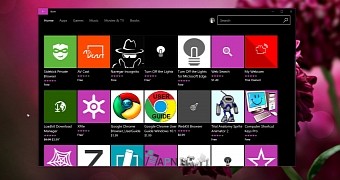Earlier this month, we told you about an issue that came to our attention after being reported by a reader and Windows 10 user: the Windows Store was again full of spam and a simple search for “Google Chrome,” a browser that’s not even in the Store, returned tens of spam results.
Microsoft has apparently started the spring cleaning and this week these spam apps were all removed, with the Store now providing a much cleaner experience without all those items attempting to steal your money by tricking you into believing you buy the real deal.
Specifically, these apps are trying to use the name and icons of legitimate apps that aren’t yet available in the Store to convince users to download them. The trick is that most of them aren’t even offered free of charge, so when someone wants to download a specific app, they have to pay a small price, often in the region of $1.
To be published in the Windows Store and pass the automatic checks, most apps are submitted as product guides, so in the case of Google Chrome, they were all apps that included tutorials and instructions on how to use Google’s browser.
Focus on quality, not on quantity
It goes without saying that these apps should never be published in the Windows Store, and it’s not the first time when Microsoft needs to remove lots of items due to violating Store rules.
In fact, Microsoft previously promised to focus more on quality rather than on quantity, pointing out that it was looking to offer users a clean and secure experience, without allowing anything else beside quality apps in the Windows Store.
Unfortunately, spam apps keep reaching the Store every once in a while, but if there’s something that deserves to be praised this time, it’s the quick reaction the company had to remove the reported apps.
We’ll keep an eye on anything that doesn’t look legit and which makes it to the Store, and make sure you report any violation you discover either to us or to Microsoft directly.

 14 DAY TRIAL //
14 DAY TRIAL //